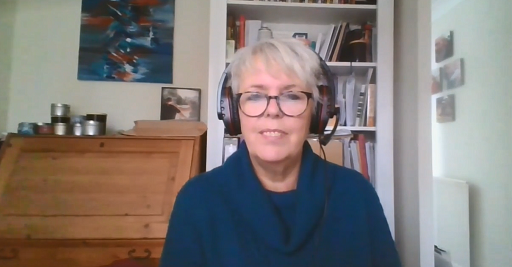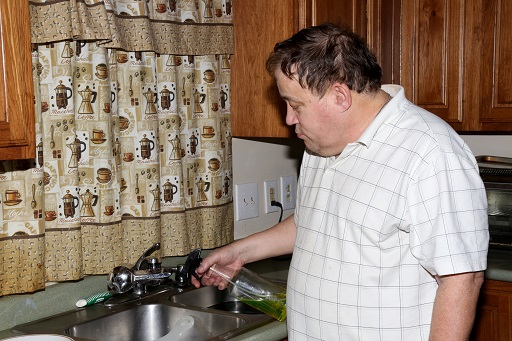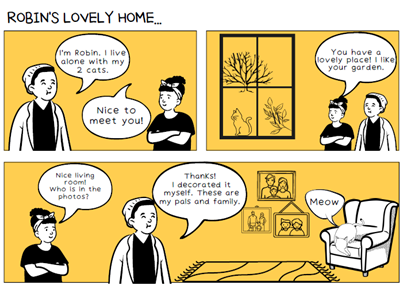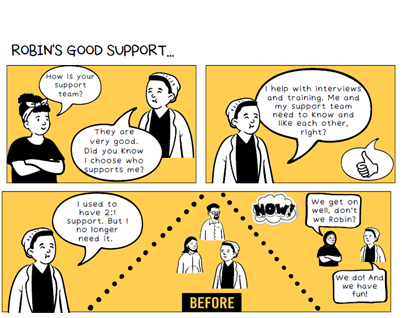1 Introducing Robin
You’ll now be introduced to another case study, Robin.
Activity 1 Learning about Robin’s life
Watch the following to find out more about Robin and his life.

Transcript
Read the longer vignette about Robin which provides some more details about his life. As you read, make notes on any issues that the professionals supporting Robin should consider as part of planning ahead for older age:
From an early age, Robin lived in different institutions, some of them hundred miles away from his hometown and family. He has many memories from these times, some good ones, like playing cricket and winning trophies, but many of them are painful. Robin was unhappy in these institutions, and he was considered ‘challenging’ by staff who called him ‘The Monster’.
When Robin moved to his current home, five years ago, staff discovered that he was someone with no one to talk to. Robin can be a bit shy with new people, and he likes it when people are polite and says ‘please’ and ‘thank you. As Robin settled into his new home, he received 2:1 support during the day, and support staff stayed in the house at night. Staff saw that Robin did not like having many people in his house and eventually it was decided that one person was enough to support Robin during the day and that he did not need anyone to stay overnight. Robin now plays an active part in the recruitment and training of his support staff. He thinks it is important that his support staff are ‘kind and gentle’.
Robin is very houseproud, and his home is full of his belongings and favourite things, including birthday balloons, multiple DVDs and a Christmas tree that is on display all year long. He has lived in his house for 5 years. The colour on the walls, pale blue, was chosen by Robin. Robin also has a garden, two cats and multiple fish tanks. His garden is a source of joy and pride for him and he learned gardening from his mother. They still garden together. Robin enjoys looking after his fish, gardening, and spending time with his two cats. Robin also has many DVDs, CDs, and a computer that he plays video games on. His favourite video game is ‘Robin Hood’.
Robin sees his family often and likes to go out with his mother and his little nephew, however, Robin’s favourite thing to do is going treasure hunting with his staff. His mother sometimes accompanies him and so does his baby nephew, but they generally stay in a café nearby whilst Robin hunts for treasures in caves, coves, and woods.
Robin wants a girlfriend but finds it difficult to meet other people to make friends. Before the COVID-19 pandemic, once a week Robin attended a social group for people with learning disabilities. The staff are supporting Robin to get to know people where he lives and working on his meeting people his own age in the wider community.
Staff are supporting Robin to take an increased role in managing his health. Robin has a smartwatch which he uses to check his steps, check his heartbeat, and be aware of current sleep patterns the intention is for the information to help him make healthier choices for the future. Regular health and care planning days are arranged, and the location is chosen by Robin. Robin’s mum and the supporting team are invited to the meeting. Robin doesn’t like meetings about him so may not attend, he is happy for the meeting to go ahead without him. Before the meeting, Robin works with the staff to create boards to visualise dreams and nightmares to inform his health and care plans.
Staff arrange opportunities for Robin to attend Annual Health Checks with his GP. Robin finds reading and spelling difficult, so staff support him to complete the ‘Easy Read’ paperwork. Robin has a Health passport which is updated by the staff supporting him at home. To help Robin gain an understanding of his health, staff have created a newspaper, having visual information offers Robin the opportunity to consider the information before talking to staff. When Robin first moved to his current home, he refused to attend health check appointments, asking his mum to go in his place. Through the support from the staff over the five years Robin attends his appointments, he can talk about his health to professionals.
Listen to Gail as she reflects on Robin’s experiences.

Transcript
Discussion
There are a number of considerations for professionals supporting Robin as part of planning ahead for older age.
- Involving Robin in the recruitment and selection of the members of his support team.
- Remaining in his home.
- Maintaining relationships with his family.
- Supporting Robin during bereavement.
- Developing and maintaining friendships and intimate relationships.
- Supporting Robin to independently manage his mental and physical health.
- Involving Robin in meetings which are about him, e.g. health and care planning days.
- Offering Robin support to access Annual Health Checks.
- Supporting Robin to maintain his Health Passport.
- Providing information in Easy Read formats.
- Offering Robin support to develop an end-of-life plan, Will and Advanced Decision for his health and finances.
You may have identified other issues. The key consideration is that Robin is involved in all decisions about him and supported to remain as independent as possible as he grows older.
Meeting someone for the first time leaves a lasting impression. Hannah (Assistant Service Leader) informed researchers that the previous service provider gave her an impression of Robin which was negative and focused on his behaviour and the ‘challenge’ towards staff. In his current home, Hannah identifies they have a positive perspective and view such behaviours as originating in distress and being misunderstood, a form of ‘communicating in a world that doesn’t want to listen’.
The staff in his new home make it their responsibility to support Robin and make it easier for people to understand Robin and his perspectives. To help the researchers to prepare for their first meeting with Robin, Hannah (Assistant Service Leader) emailed some top tips for spending time with him.
In the video, Gail reminds us of the importance of having a stable and supportive team of people who know the person well and is person centred. Health and care workers need to recognise that they are products of their own life experience and journey, and this has an impact on their behaviour, and how they respond to people and the environment around them. When working with older people with learning disabilities health and care workers must always be mindful of the persons experience when supporting them.



